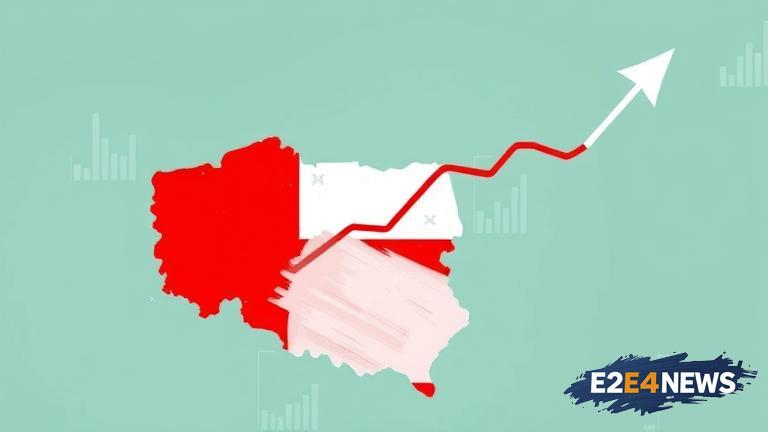Poland’s economy has been making waves in recent years, with a significant surge in growth that has left many experts impressed. Despite global uncertainty and trade tensions, Poland has managed to maintain a steady pace of economic expansion, with its GDP growth rate outpacing many of its European counterparts. This growth has been driven by a combination of factors, including a highly skilled workforce, a favorable business environment, and a strategic location at the heart of Europe. Poland’s economy has also been boosted by its membership in the European Union, which has provided access to a large and integrated market. The country’s economic growth has been further supported by a series of investments in infrastructure, including roads, railways, and airports. These investments have helped to improve connectivity and facilitate trade, making Poland an attractive destination for foreign investors. In addition to its economic growth, Poland has also been making strides in terms of innovation, with a number of startups and tech companies emerging in recent years. The country’s capital, Warsaw, has become a hub for entrepreneurship and innovation, with many incubators and accelerators providing support to new businesses. Poland’s economic growth has also had a positive impact on the country’s labor market, with unemployment rates falling to historic lows. This has led to an increase in consumer spending, which has in turn driven growth in the retail and services sectors. The country’s economic growth has also been driven by a strong manufacturing sector, with Poland becoming a major producer of goods such as cars, electronics, and machinery. The country’s agricultural sector has also been performing well, with Poland becoming a significant exporter of food products. Despite the many positive trends in Poland’s economy, there are also challenges that need to be addressed. One of the main concerns is the country’s dependence on foreign investment, which can make it vulnerable to external shocks. There are also concerns about the country’s brain drain, with many of its most talented young people emigrating to other countries in search of better job opportunities. However, the Polish government has been taking steps to address these challenges, including investing in education and training programs to help develop the skills of the workforce. The government has also been working to improve the business environment, with a series of reforms aimed at reducing bureaucracy and increasing transparency. Overall, Poland’s economic growth is a testament to the country’s resilience and adaptability, and its ability to thrive in a rapidly changing global economy. With its highly skilled workforce, favorable business environment, and strategic location, Poland is well-positioned to continue growing and developing in the years to come. The country’s economic growth has also had a positive impact on its relations with other countries, with Poland becoming a key player in European trade and diplomacy. Poland’s economic growth has also been recognized by international organizations, with the country being ranked as one of the most attractive destinations for foreign investment. In conclusion, Poland’s economic growth is a significant achievement that reflects the country’s strong fundamentals and its ability to adapt to changing global trends. With its highly skilled workforce, favorable business environment, and strategic location, Poland is well-positioned to continue growing and developing in the years to come.
